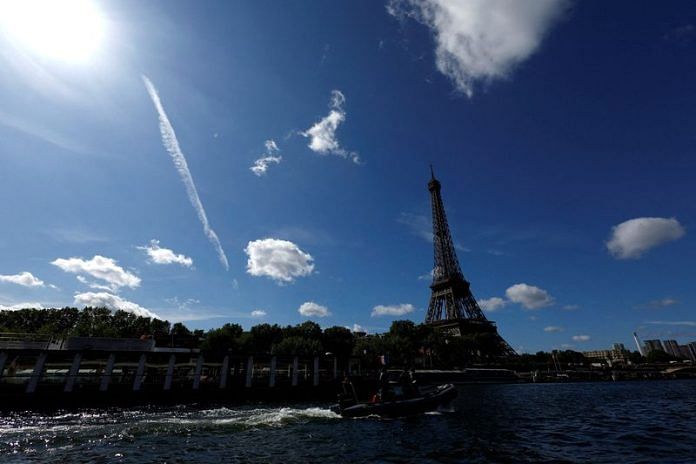By Michel Rose and Julien Pretot
PARIS (Reuters) – When early proponents of hosting an unprecedented Olympics opening ceremony along the river Seine first pitched the idea to the then-head of Paris police, he was dead-set against it.
“It’s madness,” Didier Lallement said in 2021, according to two sources, citing the vast logistical and security challenges of throwing such an ambitious event in a city still marked by a series of 2015 Islamist attacks that killed 130 people.
With the spectacular floating parade due to set off along the Seine on Friday evening, President Emmanuel Macron will hope Lallement’s doubts prove ill-founded.
“At the beginning, it seemed to be a crazy and not very serious idea,” Macron told foreign reporters at the Elysee palace on Monday. “But we decided it was the right moment to deliver this crazy idea and make it real.”
France has rolled out its biggest ever security operation to safeguard the Games and its blockbuster opening ceremony. Officials say there is no direct threat to the Games, but say they have so far foiled two suspected attacks.
Up to three billion people are expected to tune in for the opening ceremony, in which athletes will sail 3 1/2 miles down the Seine against one of the world’s most stunning backdrops.
Organisers have largely kept their plans for the ceremony under wraps, but Thomas Jolly, the artistic director for the event, spoke this week of “a large fresco” celebrating “the relationship that Paris and France maintains with the world.”
Lallement’s office, the General Secretariat for the Sea where he now works, did not immediately respond to a request for comment.
Whether France pulls it off remains to be seen. But just getting every one on board with the idea pitched by Paris 2024 chief Tony Estanguet to Macron in 2019 was a major battle.
The seed of the idea came to Estanguet, a three-time Olympics canoeing champion, after he witnessed the opening ceremony of the 2018 Youth Olympics, which was held in the streets of Buenos Aires and attended by more than 200,000 people, his advisers said.
Estanguet wanted to throw “away the rule book” for Paris 2024, they said. So he tasked Paris 2024 Executive Director Thierry Reboul, a former Air France advertising chief now in charge of the Olympic ceremony, with finding an original idea.
Inspiration struck in 2019, when Reboul was strolling along the Seine – the opening ceremony would take place on the river.
Paris mayor Anne Hidalgo told Reuters she was keen from the get-go. But not everyone agreed. Aside from Lallement, police unions were also against the high-risk river ceremony, union officials said.
However, Macron was immediately seduced by the idea, and pushed sceptical police and intelligence officials to make it happen, sources close to the president said.
“I don’t want to know what you think, I want to know how we can do it’,” a source close to Macron recalled him saying.
Macron pledged to give police more headcount to secure the event. He also commissioned a confidential “feasibility report” which in 2021 concluded the Seine ceremony was possible under certain conditions, with fewer spectators and more police.
Macron made the announcement public in late 2021 to ensure there would be no going back, the source close to him said, but has said there are back-up plans if the event can’t proceed.
NO STONE LEFT UNTURNED
Many foreign delegations expressed scepticism, and at one point some even threatened to cancel their attendance, another French source with knowledge of the matter said.
“They were told no stone would be left unturned,” the source said, adding that French authorities decided to be “over zealous” by deploying 45,000 police to secure the event, more than triple what is used for a regular Bastille Day celebration in the whole Paris region.
“It’s huge, but it’s the little exaggeration that was needed so we’re secure and confident, and we have clearly reassured the 200 delegations that gave their green light,” the source said.
In the end, thousands of manholes were wielded shut on the route, cellars and Airbnb rentals along the river were searched, and even the catacombs were checked, Interior Minister Gerald Darmanin said this week.
Macron threw one final curve ball with his decision to dissolve parliament less than two months before the opening ceremony. The resulting election has yielded a caretaker government, but officials say planning is unchanged.
Mayor Hidalgo, a Socialist who rarely has a kind word for Macron’s pro-business government, had to work hand in hand with Darmanin, a conservative, to make the ceremony happen.
“I told him: ‘We succeed together, or we fail together,” she told Reuters.
(Reporting by Michel Rose and Julien Pretot; Editing by Gabriel Stargardter, William Maclean)
Disclaimer: This report is auto generated from the Reuters news service. ThePrint holds no responsibilty for its content.



